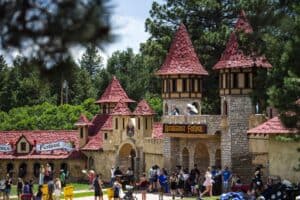Falcon residents might have noticed fewer honey bees on their Russian Sage bushes and zucchini plants this summer. The Black Forest fire and a disease known as Colony Collapse Disorder have reduced bee populations by more than 65 percent. Local beekeepers are asking for residents’ help to bring the pollinators back.According to the U.S. Department of Agriculture, beekeepers started reporting unexplained hive losses in October 2006. Researchers started tracking the disorder in which the queen bee, the young brood (egg/larvae and the young bee) and plenty of honey remained in the hive, but the vast majority of adult bees had disappeared. CCD differs from normal winter losses, swarming season or other pathogens when the queen would leave with a portion of the hive, or many dead adult bees would be found.While the USDA states that no cause has been proven, independent studies cited in the CCD Annual Progress Report show that ìbees are exposed to a wide range of pesticides that have interactive effects with other pesticides and viruses.î European Union member states issued a two-year moratorium on the use of neo-nicotinoid pesticides believed by some researchers to be the cause of CCD.Even if the exact cause is unknown, bee populations are affected in Colorado. ìIt is a combination of things,î said Beth Conrey, president of the Colorado Beekeepers Association. ìWinter losses were very high this year and swarm season was down over 60 percent. That is an indicator that wild and managed hives are having grief in the current climate.îThe Black Forest fire also caused significant bee losses for eastern El Paso County. Black Forest Honey, owned by John and Donna Hartley, lost their 38 hives. The Hartleys were also major suppliers of equipment and queen bees for hobby beekeepers throughout the Pikes Peak region. ìA lot of people have asked us if the bees just flew away,î Donna Hartley said. ìThey can’t fly through thick smoke. The way the fire moved so fast and twisted back on itself, we’re pretty sure they all died.îSeveral hobby beekeepers in Black Forest experienced losses as well. ìHobby beekeepers have one or two hives each. We don’t know how many of those were destroyed, but we trained a lot of them,î Hartley said. Conrey said wild hives were likely destroyed as well. ìWhen any 1 square mile of land burns, you’re obviously burning everything. Bees and all,î she said.Beekeepers do more for the economy and homeowners than just sell honey. ìWhat do bees do? Food. Honeybees are responsible for one-third of the human diet,î Conrey said. ìThat’s pretty important. If all of a sudden Rocky Ford melons stop getting pollinated, then you have problems.îìIf they’re gardeners, they want bees,î Hartley said. ìWe’ve heard people say that they’re sick of hand-pollinating their zucchini. They shouldn’t have to do that.î Managed hives in neighborhoods help homeowner gardeners and landscapers with edible plants and flowers.There are two main things homeowners can do for the bees, Conrey said. ìThe first thing we ask people to do is quit using pesticides. Second is plant native flowers for bees and other pollinators,î she said. ìIf everyone was to plant something they can forage from and stop using chemical pesticides that would be a huge benefit for everyone.î The Beekeepers Association also recommends that landowners in burn areas re-seed with native wildflowers and grasses to provide forage for stressed pollinators trying to repopulate the area.The Hartleys are already working on rebuilding their apiary empire from their temporary home in Falcon Hills. The couple has been working on building and painting new hives to replace the ones lost in the fire, Hartley said. They have also placed single hives in receptive homeowners’ backyards to help recover populations around Falcon and Black Forest.ìThere’s been growth at the hobby level statewide,î Conrey said. ìBut the commercial level has been static or declining. A lot of those guys are older and they’re retiring.î Conrey said the state association has about 1,100 members.The Hartleys have been keeping bees for about 40 years, Hartley said. ìPeople who love bees are easy to spot,î she said. ìThey see them for what they are. Bees are livestock and a productive species.î







